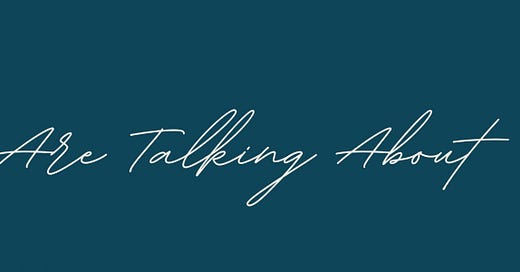Talent Fairy Talking Points
Musings on the editorial job market from the industry's matchmaker. #editorsmakethebesthires
★ All the publisher-AI partnerships. ChatGPT is buddying up with one media company after another (Dotdash-Meredith, Vox Media, The Atlantic, the Wall Street Journal, News Corp…). The industry is divided: Are we getting in bed with the devil? Or protecting ourselves from imminent destruction? I'm in camp A along with Jessica Lessin who says it best in the Atlantic: “Publishers … are trading their own hard-earned credibility for a little cash from [AI] companies that … clearly intend to replace them.”
★ Disrespecting Candidates. Job seekers in our industry are burn-it-to-the-ground angry about a worsening problem: Companies ghosting candidates (even executive- level ones) mid-way through the hiring process. In my own survey, 61% of candidates in our industry reported being ghosted. Can we all just agree to be better here?
★ Jobless recent grads. So many entry-level duties (admin work, calendar scheduling, basic writing and editing) now comes in the form of an AI tool. That’s one reason why entry-level jobs harder to come by this year. This trend could be tragic for our industry’s future. One way to help: Sign up to be mentor in my 2024 Editorial Mentor Program!
The 5 Characteristics of A Rock Star Head of Content
Creating good content that drives the results you want is trickier than it looks. How do you crack that nut? First, you have to find the right person to lead your content marketing team. I’ve found it comes down to them harnessing these characteristics:
They are nimble. SEO is out, SGE is in. Homepages are hot. Podcasts are not. Newsletters are new again. … The distribution channels open to brands have become unpredictable and more costly in this transition stage where AI’s power is looming. You need someone who is versatile across channels — audio, video, social, even print (!) — and can quickly adopt and adapt the content strategy to reach your audience, wherever they are.
They are audience-driven. This is where hiring talent with an editorial background provides an advantage. Former editors and journalists are trained to see through the lens of the audience. It’s also a huge win if they are an expert in your brand’s industry — be it healthcare, personal finance, technology, beauty, fashion, you name it. They will inherently understand how to create and execute your brand voice.
They are AI curious. Your head of content doesn’t need to be an expert, but they do need to whole-heartedly embrace AI. The most desirable talent is someone who is willing to experiment with the variety of AI tools on offer and be strategic about when to use them, and when not to.
They are diplomats. A huge part of the job as a content marketing leader is taking input from multiple stakeholders who often don’t share the same POV on how a piece of content should be executed. You need a leader who is skilled at juggling conflicting interests and is politically savvy about who to appease and who frankly to say no to. You don’t want to end up with a content pizza.
They mix science with art. A strong head of content must have a knack for numbers and embrace the importance of hitting KPIs. But the best content leaders are ones who also know when to go with their guts. It comes back to understanding their audience well enough to take risks, think outside of the box, and allow for creativity to fuel the strategy. This is where editorially trained leaders thrive: They don’t just give audiences what they want; they anticipate and deliver what they didn’t know they wanted.
Didn’t Write This But Wish I Had
Do You Really Have an Inclusive & Diverse Workplace? Answer These Questions
How does a brand go about setting up a structure for actual, true female empowerment? It’s not an exhaustive list, but it covers the bare-minimum feminist-oriented elements of a brand that can honestly say it’s built on things like empowerment, diversity, and inclusion:
Is your staff made up of a diverse group of people, including people of color, LGBTQ people, women, and combination therein? Are you treating them well?
Are there people of color, women, LGBTQ people and combinations therein in leadership positions? More than one? Are those people of different identities from each other?
Are you paying everyone fairly, based on the work they are currently doing?
Do they have good benefits? Do they have parental leave?
Does the product you’re selling actually improve the lives of the people who purchase or use it in a meaningful way?
Do the images you’re using to sell your product show a wide range of women? Are those women paid and treated well?
Are you giving back to the community that you’re making money off of?
Does every step of the production process use fair labor? Is it environmentally sustainable?
Can anyone of any body type use and benefit from your product?
Are the people financially benefiting from the success of your product also invested in empowering marginalized communities? What are they doing to show that?
— excerpted with permission from the collection of essays by Gabrielle Korn, former EIC of Nylon: Everybody (Else) is Perfect: How I Survived Hypocrisy, Beauty, Clicks, and Likes (Simon & Schuster)
What’s involved in being a mentor? It’s low lift, high value.









